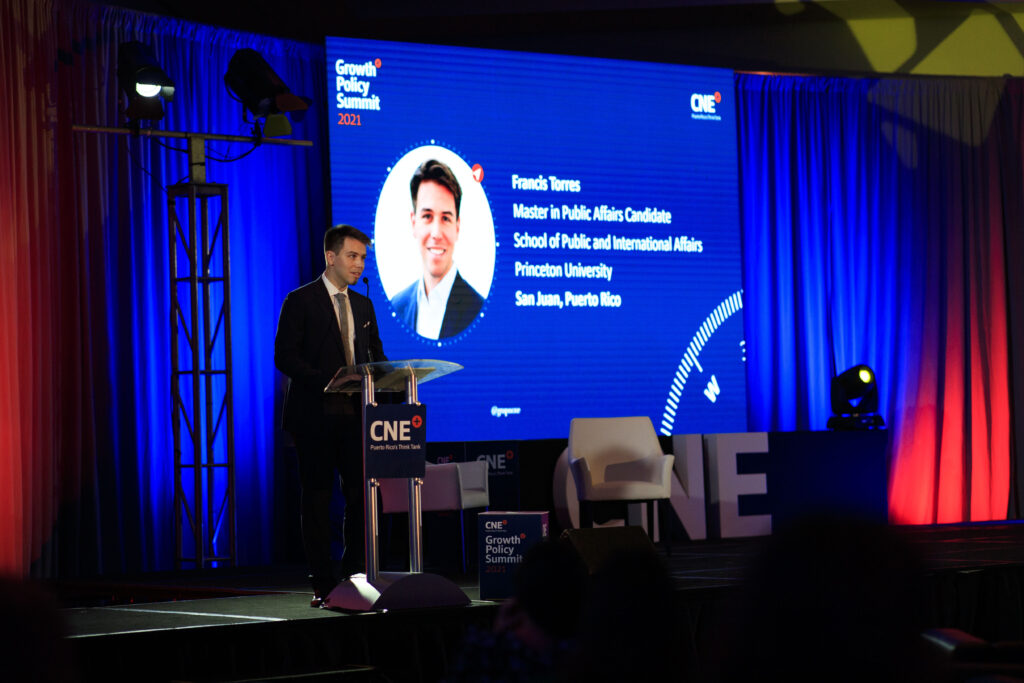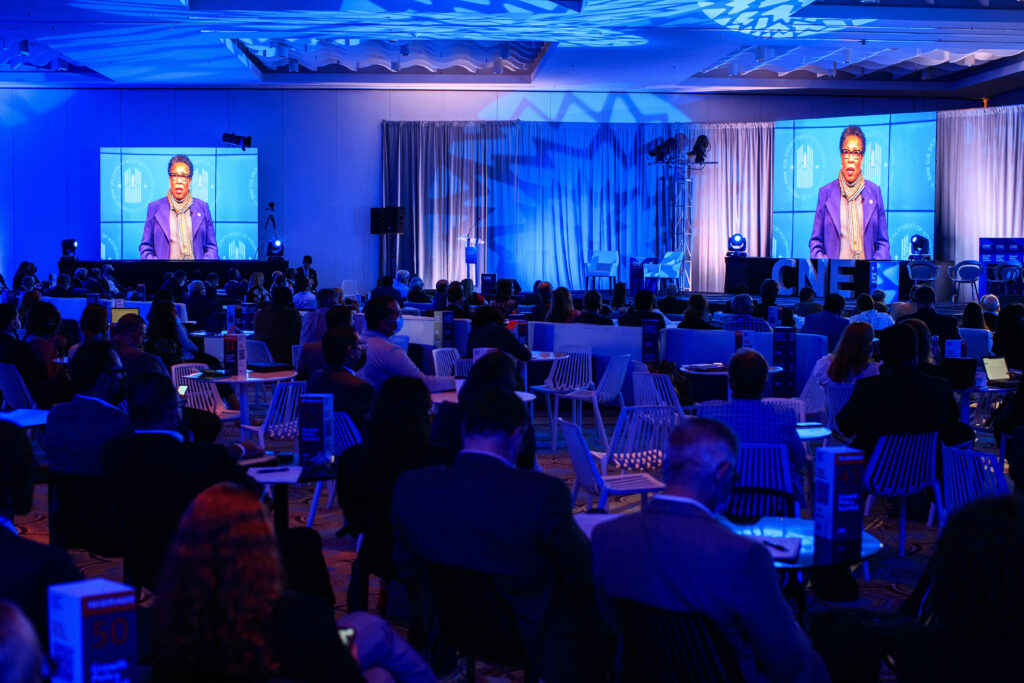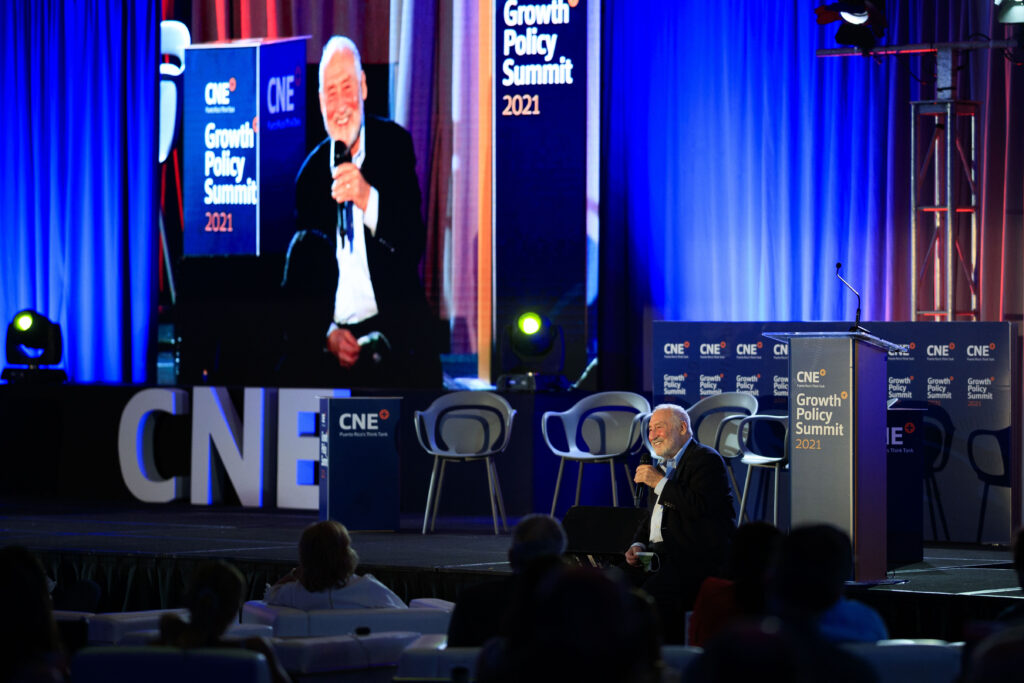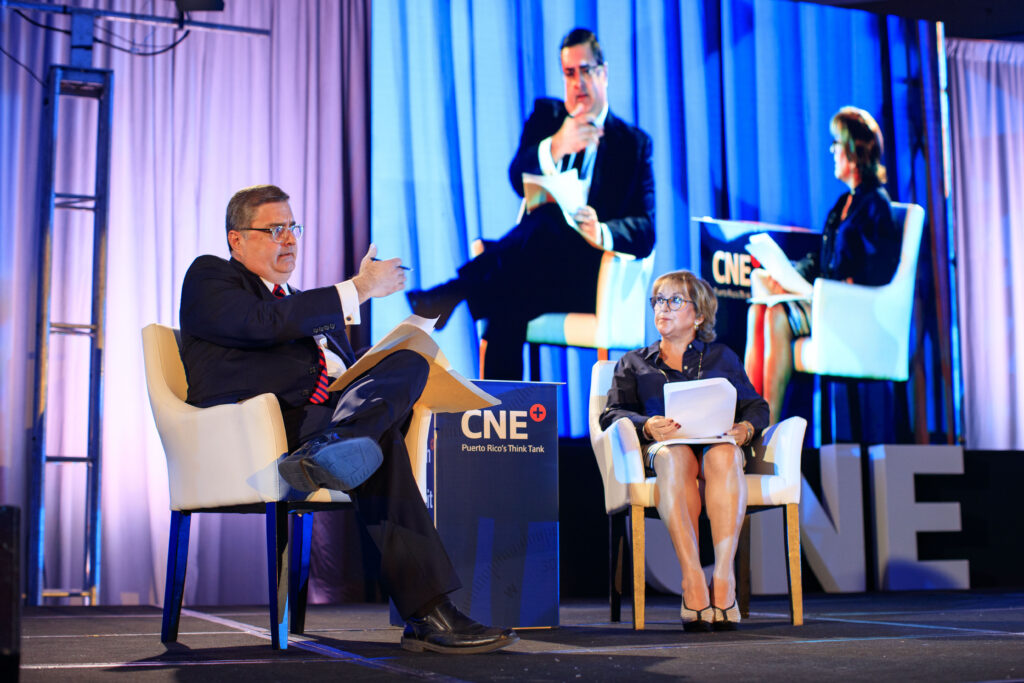

December 3, 2021
Hotel Sheraton Puerto Rico
The CNE 2021 Growth Policy Summit was an innovative convening where eye-opening realities and new approaches were discussed by students, academics, and a diverse group of professionals committed to turning around Puerto Rico’s current state of affairs. Despite the uncertainty and the newness of this post-pandemic world we now live in, the Summit addressed tough policy questions Puerto Rico must grapple with in order to chart a way forward towards a more prosperous, equitable, and sustainable future.
The event was possible because of the generous support of our sponsors. Thanks again to Bermúdez, Longo, Díaz-Massó, LLC, Fundación Aireko, Herb Allen, III & Mónica de la Torre, MB Holdings, Professional Offices Park, GFR Media, Hotel Sheraton Puerto Rico, HUB CLC, Puerto Rico Supplies, RIMCO, and Empresas Caparra.
We would also like to thank Francis Torres for his outstanding participation as Master of Ceremonies.
Keep scrolling to watch videos of each panel and presentation.
Welcoming Remarks

Miguel A. Soto-Class
President & Founder
Center for a New Economy
San Juan, Puerto Rico
Mike Soto-Class founded the Center for a New Economy (CNE) in 1998, and since then has steered CNE into becoming one of the most credible and influential voices in Puerto Rico. Beginning in 2014, CNE has been recognized yearly as one of the Top Think-Tanks to Watch by the Global Think Tank Report of the University of Pennsylvania.
Mike was an editor of The Economy of Puerto Rico: Restoring Growth, which was published by the Brookings Institution in 2006 and selected that same year as a Notable Book by the American Library Association. He has been a columnist for El Nuevo Día, Puerto Rico’s largest circulation daily, since 2003, and was the host of a weekly news radio program on economics at Radio Universidad in the University of Puerto Rico for several years.
Mike served as an Advisory Board member of the Community Innovator’s Lab at MIT in Cambridge, Massachusetts; as a Board member of Endeavor Puerto Rico, a non-profit with an international reach committed to supporting high-impact entrepreneurs; as the Founding Chairman of Espacios Abiertos, an organization dedicated to growing civic capacity and promoting transparency in Puerto Rico; a member of the YouthSave Advisory Board at the New America Foundation in Washington, D.C.; and as Co-Chair of ReImagina, the Advisory Commission for a Resilient Puerto Rico. In 2008, he was selected as an Aspen Institute Ideas Fellow.
He currently serves as Yale Alumni Schools Director for Puerto Rico and the Virgin Islands, as well as a member of the Board of Directors of the Baldwin School of Puerto Rico, and an Emeritus Member of the Advisory Council for the Conservation Trust of Puerto Rico.
Mike has a B.A. from Yale University and a Juris Doctor from Vanderbilt University.
A Grand Tour of Efforts Past
Why has forging a new economic model for Puerto Rico proven so difficult? What have been our limitations? What are our current strengths? This presentation will provide an understanding of policies that have been tested and proposals that have been ignored in order to spell out what needs to be done to spur future economic growth.

Francisco A. Catalá, Ph.D.
Professor of Economics Emeritus
University of Puerto Rico
San Juan, Puerto Rico
Click here to read about Francisco
Francisco A. Catalá has a bachelor’s and master’s from the University of Puerto Rico and a Ph.D. in Economics from Georgetown University. He was a professor at the University of Puerto Rico, Rio Piedras campus and worked as a consultant in the labor and cooperative fields. He has published articles and several books on the political economy of Puerto Rico as well as the labor and cooperative field. His books include Promesa rota: una mirada institucionalista a partir de Tugwell (2013), El movimiento cooperativista en Puerto Rico: un paso más (2007), Elogio de la imperfección (2007), and El callejón del sapo: teoría y gestión del cooperativismo (2004). His most recent book is entitled Puertas Abiertas: economía política de atrofias, transiciones y temores (2021).
Determinants of Growth & State Capacity: Lessons from Spain
During the past year, FEDEA has produced a series of important works on how Spain can strengthen its institutional capacity to handle the expected influx of NexGen EU funds. We believe that Puerto Rico can abstract important lessons from the Spanish experience in order to ensure that the island uses reconstruction funds in a truly transformative way.

Ángel de la Fuente, Ph.D.
Executive Director
Foundation for Applied Economics Studies
Madrid, Spain
Click here to read about Ángel
Ángel de la Fuente is Executive Director at the Foundation for Applied Economics Studies (FEDEA), one of Spain’s most prestigious think tanks. He holds a Ph.D. in Economics from the University of Pennsylvania, where he obtained the award for best doctoral dissertation in 1991, and an MBA from Drexel University. After his return to Spain he joined the Institute of Economic Analysis of the Spanish Council for Scientific Research (CSIC), where he is Senior Scientist on leave. He has been Deputy Director at the Center and member of the organization’s Humanities and Social Sciences Commission. He is Associate Professor at the Universitat Autònoma de Barcelona and has taught postgraduate courses at various Spanish universities, as well as seminars at the Bank of Spain, the European Central Bank and the European Commission. He is also research fellow at the CESIfo Institute in Munich, member of the Barcelona Graduate School of Economics, Executive Editor of the Revista de Economía Aplicada and has been senior member of the European Expert Network on the Economics of Education. De la Fuente has worked as a consultant for the World Bank, the OECD, the European Commission and various Spanish administrations. In 2002 he received the accésit of the I Banco Herrero Foundation Award for young researchers in the Social Sciences.

Jennifer Wolff, Ph.D.
Director
Madrid Policy Bureau
Center for a New Economy
Madrid, Spain
Click here to read about Jennifer
Jennifer Wolff is Director at the CNE Policy Bureau in Madrid. She has been part of the CNE team in various roles, previously serving as Senior Program Director and as Director of Programs and Communications in CNE’s office in San Juan.
Jennifer joined CNE after a career in journalism and communications. She was General Manager at Hill & Knowlton’s Puerto Rico office and Vice President at Comstat Rowland, where she specialized in corporate communications, crisis management, and public affairs. Before that, she served as investigative reporter, news anchor, and producer of informative shows at WKAQ-TV, WAPA-TV, and WLII-TV, where she covered government, politics, and hard news. She also developed special broadcast reports of international events in countries such as Somalia, Kuwait, Bolivia, and Cuba. Her work garnered over 25 journalism, public relations, and communications awards.
Jennifer holds a Ph.D. in History from the University of Puerto Rico and a Magna Cum Laude Double B.A. in History and Latin American Studies from Duke University. She has served on the board of directors of United Way de Puerto Rico and the Puerto Rico Chamber of Commerce.
Can Governments Learn?:
The Role of Experts and Non-Governmental Actors in Helping Tackle Critical Problems
How can governments collaborate with academic, scientific, and philanthropic communities to draw lessons from past efforts that can be used to improve their public policies and processes in the future? How can governments learn from the recent crises we have faced and what institutions are necessary for this learning to take place?

Gustavo Bobonis, Ph.D.
Professor of Economics
University of Toronto
Toronto, Canada
Click here to read about Gustavo
Gustavo J. Bobonis is Professor and Canada Research Chair in the Political Economy of Development at the University of Toronto. He is Fellow of the Bureau for Research and Economic Analysis of Development (BREAD), Affiliate of the Jameel Poverty Action Lab (J-PAL), and currently Editor-in-Chief of Economía, the Journal of the Latin America and Caribbean Economic Association, and Associate Editor of The Review of Economics and Statistics and Economic Development and Cultural Change. His academic research focuses on economic development, political economy, public and labor economics in the Americas, with his most recent work focusing on the consequences of government policy for politics, public service delivery, and the wellbeing of disadvantaged households. Professor Bobonis received his BA in Economics from the University of Puerto Rico, and his PhD in Economics from the University of California, Berkeley.

Daniel Colón-Ramos, Ph.D.
President
Puerto Rico Scientific Coalition
New Haven, Connecticut
Click here to read about Daniel
Daniel Colón-Ramos was born and raised in Puerto Rico. He completed his B.A. at Harvard University, his Ph.D. in the lab of Dr. Sally Kornbluth at Duke University and was a postdoctoral fellow in the lab of Dr. Kang Shen at Stanford University. The Colón-Ramos lab is interested in how synapses are precisely assembled to build the neuronal architecture that underlies behavior. To address this, they developed tools in the thermotaxis circuit of C. elegans. Their system enables unbiased genetic screens to identify novel pathways that instruct synaptogenesis in vivo, and single-cell manipulation of these pathways to understand how they influence behavior. As mechanisms underlying synapse structure and function are conserved, the research program seeks to enhance our understanding of synaptic cell biology in higher organisms, which may be important for disease.

Yolanda Cordero, Ph.D.
Professor of Public Administration
University of Puerto Rico
San Juan, Puerto Rico
Click here to read about Yolanda
Yolanda Cordero Nieves is a retired Professor of the Graduate School of Public Administration in the Faculty of Social Sciences at the University of Puerto Rico, Río Piedras campus. She holds a Ph.D. in Industrial Organizational Psychology from the UPR and a Master of Arts in Sociology from the University of Chicago. She has held various management positions in the Government of Puerto Rico, among them, Associate Director of the Office of Management and Budget and Director of the Office of Human Resources for the Municipality of San Juan. Cordero Nieves is a specialist in the field of human resources management in the public sector. He has published in the specialized magazines Reforma y Democracia del CLAD, the Revista de Administración Pública, Revista de Ciencias Sociales, Revista Ethos and the Revista Profesional Recursos Humanos: enfoques, tendencias y perspectivas.

Eileen Segarra, Ph.D.
Professor of Economics
University of Puerto Rico
San Juan, Puerto Rico
Click here to read about Eileen
Dr. Eileen Segarra Alméstica specializes in the areas of public finance, labor economics, and development economics. She earned her Ph.D. in Economics from the University of California at Berkeley. She currently works as a professor in the Department of Economics, researcher at the Center for Multidisciplinary Studies on Government and Public Affairs, and Director of the Observatory of Public Education at the University of Puerto Rico, Río Piedras campus. Her research areas include the development and analysis of public policies. Her recent works address the issues of education, gender disparities, government decentralization, poverty, inequality, and vulnerability. Her previous research includes areas of public policy, such as: public welfare and labor participation programs, tax evasion, government corruption, political discrimination in public employment and government performance and the promotion of entrepreneurship and its effect on poverty.
Panel Moderator: Nicole Acevedo, Reporter at NBC News and NBC Latino
Click here to read about Nicole
The Importance of Evidence-Based Policymaking
Why is evidence-based policymaking so important? How does it make a difference in providing people with better opportunities and tackling system inequalities? How can we foster the implementation of evidence-based decision-making in our government programs and public policies? What role does philanthropy play in addressing society’s most complex problems?

Laura Arnold
Co-Founder and Co-Chair
Arnold Ventures
Houston, Texas
Click here to read about Laura
Laura Arnold is the co‐founder and co‐chair of Arnold Ventures, a national philanthropy focused on maximizing opportunity and minimizing injustice through public policy change. For the past 10 years, Laura, her husband John, and their team have worked to advance bipartisan policy solutions to complex problems in America’s criminal justice, health care, education, and democratic systems.
Before founding Arnold Ventures, Laura served as a corporate lawyer and executive in the energy industry. A native of Puerto Rico, she earned her J.D. from Yale Law School, M.Phil. in European Studies from the University of Cambridge, and B.A. from Harvard College.
Laura has been a leading voice in criminal justice reform, advocating for solutions to fix a system that she has described as deeply broken, inefficient and unjust. She is a founding partner of the REFORM Alliance, a national criminal justice advocacy organization dedicated to reducing the number of individuals needlessly ensnared in a punitive system of mass incarceration, the revolving door of probation and parole and the penalizing nature of fees and fines. She also serves on the advisory board at Stanford PACS, a research center that seeks to explore and share ideas that drive social change.
Laura is the host of the podcast, “Deep Dive with Laura Arnold” which explores evidence‐based policy change. The podcast and more information about Arnold Ventures is available at www.arnoldventures.org.

Miguel A. Soto-Class
President & Founder
Center for a New Economy
San Juan, Puerto Rico
Mike Soto-Class founded the Center for a New Economy (CNE) in 1998, and since then has steered CNE into becoming one of the most credible and influential voices in Puerto Rico. Beginning in 2014, CNE has been recognized yearly as one of the Top Think-Tanks to Watch by the Global Think Tank Report of the University of Pennsylvania.
Mike was an editor of The Economy of Puerto Rico: Restoring Growth, which was published by the Brookings Institution in 2006 and selected that same year as a Notable Book by the American Library Association. He has been a columnist for El Nuevo Día, Puerto Rico’s largest circulation daily, since 2003, and was the host of a weekly news radio program on economics at Radio Universidad in the University of Puerto Rico for several years.
Mike served as an Advisory Board member of the Community Innovator’s Lab at MIT in Cambridge, Massachusetts; as a Board member of Endeavor Puerto Rico, a non-profit with an international reach committed to supporting high-impact entrepreneurs; as the Founding Chairman of Espacios Abiertos, an organization dedicated to growing civic capacity and promoting transparency in Puerto Rico; a member of the YouthSave Advisory Board at the New America Foundation in Washington, D.C.; and as Co-Chair of ReImagina, the Advisory Commission for a Resilient Puerto Rico. In 2008, he was selected as an Aspen Institute Ideas Fellow.
He currently serves as Yale Alumni Schools Director for Puerto Rico and the Virgin Islands, as well as a member of the Board of Directors of the Baldwin School of Puerto Rico, and an Emeritus Member of the Advisory Council for the Conservation Trust of Puerto Rico.
Mike has a B.A. from Yale University and a Juris Doctor from Vanderbilt University.
Puerto Rico’s Moonshot Opportunity:
An Analysis from Graduate Students at the Princeton School of Public and International Affairs
How can policymakers ensure that Puerto Rico’s economy remains viable in the post-Plan of Adjustment future? What best practices can we apply to achieve accountable governance, equitable social spending, and sustainable economic development? This presentation will preview findings and key recommendations from an upcoming report from Masters of Public Affairs students at the Princeton School of Public and International Affairs (SPIA).

Karlin Gatton
Master in Public Affairs Candidate
Princeton University
Princeton, New Jersey
Click here to read about Karlin
Karlin Gatton is a second-year Master in Public Affairs Candidate at Princeton University concentrating in economics and public policy. Prior to Princeton, Karlin spent five years working in international economic policy. Karlin started her career in the inaugural class of the U.S. Treasury Department’s International Affairs Fellow program, where she worked in the Middle East office covering North African economies. Immediately before Princeton, she was a senior analyst at the Federal Reserve Bank of New York and worked on teams that coordinate and execute the bank’s international analytical work and engagement. Karlin graduated Phi Beta Kappa from Vassar College with a bachelor’s degree in economics and a minor in Arabic.
A Special Message from

Marcia L. Fudge
Secretary of the
U.S. Department of Housing and Urban Development
Washington, D.C.
Click here to read about Marcia
Secretary Marcia L. Fudge is the 18th Secretary of the U.S. Department of Housing and Urban Development.
Throughout her career, Secretary Fudge has worked to help low-income families, seniors, and communities across the country.
Secretary Fudge served as U.S. Representative for the 11th Congressional District of Ohio from 2008 to March 9, 2021. She was a member of several Congressional Caucuses and past Chair of the Congressional Black Caucus. As a Member of Congress, Secretary Fudge earned a reputation of tackling the unique challenges of her district by working with her Congressional delegation and across political ideologies.
Secretary Fudge believes our housing issues do not fit into a one-size-fits-all approach. We need policies and programs that can adapt to meet a community’s unique housing challenges. She is committed to making the dream of homeownership – and the security and wealth creation that comes with it – a reality for more Americans.
Under Secretary Fudge’s leadership, the Department of Housing and Urban Development will work to eradicate the growing homelessness issue, put an end to discriminatory practices in the housing market, and ensure that our fair housing rules are doing what they are supposed to do: opening the door for families who have been systematically locked out for generations to buy homes and have a fair shot at achieving the American dream.
Secretary Fudge’s career in public service began in the Cuyahoga County Prosecutor’s Office, rising to the rank of Director of Budget and Finance. She earned her bachelor’s degree in business from The Ohio State University and law degree from the Cleveland State University Cleveland-Marshall School of Law. She is a Past National President of Delta Sigma Theta Sorority, Inc., and a member of its Greater Cleveland Alumnae Chapter.
Policy Implications of Recent Tax Developments
Given recent events around the world and in the United States, it is appropriate to reconsider the role of fiscal policy in the context of economic growth. What options does Puerto Rico have in light of the agreements to impose a global minimum tax? What other policies or programs are required to complement tax incentives and generate growth?

Teresita Fuentes, CPA
Former Secretary
PR Treasury Department
San Juan, Puerto Rico
Click here to read about Teresita
Teresita Fuentes served as Puerto Rico’s Treasury Secretary and was directly involved with the drafting of the 2018 Tax Reform and was the senior-most voice during conversations with the Puerto Rico Oversight Board on financial and tax matters. During her tenure, the first tax expenditure report was issued by the Puerto Rico Treasury Department while significant discussions on tax incentives were being coordinated with the Economic Development Department which culminated with Puerto Rico’s Tax Incentives Code.
She has over 30 years of tax experience in all aspects of US GAAP, and tax matters serving clients in the pharmaceuticals, biotechnology, insurance, consumer products, and technology industries. In addition, she has vast experience in tax practice and administration, both in public accounting and government. She held a leadership role for Ernst & Young’s Tax Controversy and Risk Management Services team for Puerto Rico and the Virgin Islands. She graduated from the University of Puerto Rico and from the Kellogg School of Management’s Executive Leadership Program.

Sergio M. Marxuach
Policy Director
Center for a New Economy
San Juan, Puerto Rico
Click here to read about Sergio
Sergio M. Marxuach is the Policy Director and General Counsel at the Center for a New Economy, a non-profit, non-partisan think tank. Prior to joining the Center, Mr. Marxuach served as Deputy Secretary of Commerce and Economic Development for the Commonwealth of Puerto Rico and as Special Assistant to the executive director of the Commonwealth’s Office of Management and Budget.
Before joining the Commonwealth government, he was an associate for five years in the New York City law firm of Curtis, Mallet-Prevost, Colt & Mosle LLP, where he worked mostly in Latin American transactions and international corporate matters, structuring cross-border capital market transactions, and arranging vendor financing and syndicated credit facilities for U.S. multinational firms.
His work at CNE has been cited in The New York Times, The Wall Street Journal, The Washington Post, and The Economist, among other prestigious publications. Mr. Marxuach has also been invited to testify before several Congressional committees and to brief committee staff members as well as U.S. executive branch officials on matters related to Puerto Rico’s economy and fiscal situation.
Mr. Marxuach has a B.A. in Economics and Political Science from Yale University, where he was awarded the Henry Edwards Ellsworth Prize for his Senior Essay. He also obtained a Juris Doctor degree from the Georgetown University Law Center and a Master of Science in Foreign Service from the Graduate School of Foreign Service at Georgetown University.
Education as a Driver of Economic Development
With a strong post-secondary education system responding to local recovery plans, we could overhaul our infrastructure and rebuild our middle class, who are truly the engine of growth in the economy. In this panel, we discuss the impact of education on development in Puerto Rico and the avenues to return our post-secondary educational system into a pathway to social mobility for our people and an engine of growth for our economy.

Hans Johnson, Ph.D.
Senior Fellow
Public Policy Institute of California
San Francisco, California
Hans Johnson is director of the PPIC Higher Education Center and a senior fellow at the Public Policy Institute of California, where he holds the Thomas and Marilyn Sutton Chair in Higher Education Policy. As center director, he works with a team of researchers to identify policies that can make higher educa-tion policy more successful and sustainable. His own research focuses on improving college access and completion. He frequently presents his work to policymakers and higher education officials, and he serves as a technical advisor to many organizations seeking to improve college graduation rates, address workforce needs, and engage in long-term capacity planning. His other areas of expertise include international and domestic migration, housing in California, and population projections. Previously, he served as research director at PPIC. Before joining PPIC, he worked as a demographer at the California Research Bureau and at the California Department of Finance. He holds a PhD in demography and a master’s degree in biostatistics from the University of California, Berkeley.

Elias Lopez, Ph.D.
Senior Associate VP
Sonoma State University
Rohnert Park, California
Click here to read about Elias
Dr. Elias Lopez is Senior Associate Vice President of Strategic Enrollment at Sonoma State University. A passionate educator who believes in the value of education as a public good, Dr. Lopez is proud to provide academic leadership to a university that serves nearly 8,000 undergraduate and graduate students. He has also held leadership positions at the University of California, Davis, at the Los Rios Community College system, and First 5 preschool initiative in California. He also did policy research for the California Legislature and Office of the Governor on critical topics like Wealth Distribution in California, The Manufacturing Sector and Job Training, Preschool and Childcare Enrollment, The Composition of Staff in California Community Colleges, High Growth Industries and Highly Educated Workers, The Manufacturing Sector and Job Training in California, and a Coordinated Approach to Raising the Socio-Economic Status of Latinos in California. Dr. Lopez is a strong proponent of collaboration, interdisciplinarity, and innovative teaching and learning. A champion of student, faculty, and staff success, he has more than 20 years of experience in public higher education.

Belinda I. Reyes, Ph.D.
Associate Professor
San Francisco State University
San Juan, Puerto Rico
Click here to read about Belinda
Belinda Reyes is an expert in demographics, education, immigration, urban economics, opportunity youth, and the social and economic progress of Latinx in the United States. Her work explores the intersection of demographic change and policy to examine institutional policies and practices that limit opportunities and perpetuate unequal outcomes for people of color.
Belinda has briefed various federal, state, and local governmental bodies and addressed numerous civic organizations. For example, she was an advisor to the White House Initiative of the Educational Excellence for Hispanics, which was part of President Obama’s White House Initiative on Men of Color.
Belinda is an Associate Professor at the Department of Latina and Latino Studies at San Francisco State. As the Director of the Cesar E Chavez Institute, Reyes generated hundreds of thousands in funds for research and opportunities for students. She is also an Adjunct Fellow at the Public Policy Institute of California. Previously she was a founding faculty member at the University of California, Merced; a senior program associate at PolicyLink; and a research fellow at the University of Michigan. She holds a B.S. in economics from the University of Illinois at Urbana-Champaign and a Ph.D. in economics from the University of California, Berkeley.

Francisco Rivera-Batiz, Ph.D.
Professor Emeritus of Economics
Columbia University
New York, New York
Click here to read about Francisco
Francisco L. Rivera-Batiz is Professor Emeritus of Economics and Education and an Affiliate Professor of International and Public Affairs at Columbia University. He received his Bachelor’s degree in economics from Cornell University and a Ph.D. in economics from the Massachusetts Institute of Technology. He has held teaching or research appointments at various universities, including the University of Chicago, Harvard University, the University of Pennsylvania, Rutgers University in New Brunswick, and the University of Wisconsin at Madison. Professor Rivera-Batiz has carried out extensive research in the fields of labor economics, the economics of education, development economics, and international trade and finance. His books include International and Interregional Migration: Theory and Policy (World Scientific, 2018), The Political Economy of the East Asian Crisis and its Aftermath: Tigers in Distress, co-edited with A. Lukauskas (Edward Elgar, 2001), Island Paradox: Puerto Rico in the 1990s, co-authored with C. Santiago (Russel Sage Foundation, 1996), and International Finance and Open Economy Macroeconomics, co-authored with L. Rivera-Batiz, (Prentice Hall, 1993. He is also the Editor-in-Chief of the World Scientific Encyclopedia of International Economics and Global Trade, published in 2020. His articles have appeared in leading economics journals such as the American Economic Review, Economic Inquiry, International Economic Review, Journal of Development Economics, the Journal of Human Resources, Quarterly Journal of Economics, and the Review of Development Economics. His research and opinions have been published in the Financial Times, Foreign Affairs, Los Angeles Times, Newsday, Newsweek, and the New York Times, among others.
Keynote
How to Achieve Inclusive Growth in Puerto Rico

Joseph E. Stiglitz, Ph.D.
Nobel Laureate in Economics
Professor of Economics, Columbia University
New York, New York
Click here to read about Joseph
Joseph E. Stiglitz is an American economist and a professor at Columbia University. He is also the co-chair of the High-Level Expert Group on the Measurement of Economic Performance and Social Progress at the OECD, and the Chief Economist of the Roosevelt Institute. A recipient of the Nobel Memorial Prize in Economic Sciences (2001) and the John Bates Clark Medal (1979), he is a former senior vice president and chief economist of the World Bank and a former member and chairman of the (US president’s) Council of Economic Advisers. In 2000, Stiglitz founded the Initiative for Policy Dialogue, a think tank on international development based at Columbia University. He has been a member of the Columbia faculty since 2001 and received that university’s highest academic rank (university professor) in 2003. In 2011 Stiglitz was named by Time magazine as one of the 100 most influential people in the world. Known for his pioneering work on asymmetric information, Stiglitz’s work focuses on income distribution, risk, corporate governance, public policy, macroeconomics and globalization. He is the author of numerous books, and several bestsellers. His most recent titles are People, Power, and Profits, Rewriting the Rules of the European Economy, Globalization and Its Discontents Revisited, The Euro and Rewriting the Rules of the American Economy.














